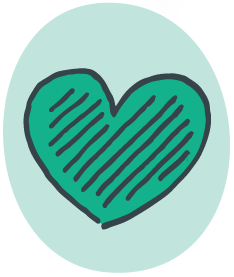How To Help a Loved One with a Substance Use Disorder

Stress and uncertainty from the ongoing COVID-19 pandemic continues to take a toll on Americans’ mental health. In a survey from July 2021, almost half of U.S. adults said the pandemic is negatively impacting their mental health. Pandemic worries, coupled with job losses, financials struggles, childcare difficulties, substance misuse, grief over lost loved ones, deepening political divides and racial injustice are just a few factors affecting mental health over the past year and half. Substance use and deaths from drug overdoses increased last year too.
More than 93,000 people died of a drug overdose in 2020—the highest number ever recorded in a 12-month period. Pandemic-related barriers to accessing treatment, in addition to lethal prevalence of fentanyl, contributed to the nearly 30% increase in deaths from 2019. And Nebraska is one of ten states with a more than 40% uptick in deaths from drug overdoses.
Even before the pandemic, Americans struggled to access substance use treatment. Nearly a quarter of people ages 12 and older don’t receive treatment because they don’t know where to go. KVC Nebraska’s Substance Use Evaluation program makes taking the first step toward recovery easier. With the help of a Substance Abuse Coordinator, clients ages 12 and older will gain access to valuable treatment resources within their home communities, including 24/7 on-call support from KVC.
Ready to work toward recovery? Concerned about a loved one? Call Shannon Bolter, LADC, at 402-201-4288 to learn about KVC’s program and resources.
What is a Substance Use Disorder?
 Substance use disorder is a mental illness that causes someone to become addicted to alcohol, tobacco, illegal drugs and/or prescription medication. It affects a person’s brain and behavior and causes them to lose control of their use of one or more substances. Even when the substance misuse leads to harmful or negative consequences, the person can’t control their cravings or urges, and it impacts their ability to function in day-to-day life. These disorders occur when the repeated use of substances causes clinically significant impairment, including health problems, disability and failure to meet major responsibilities at work, school or home.
Substance use disorder is a mental illness that causes someone to become addicted to alcohol, tobacco, illegal drugs and/or prescription medication. It affects a person’s brain and behavior and causes them to lose control of their use of one or more substances. Even when the substance misuse leads to harmful or negative consequences, the person can’t control their cravings or urges, and it impacts their ability to function in day-to-day life. These disorders occur when the repeated use of substances causes clinically significant impairment, including health problems, disability and failure to meet major responsibilities at work, school or home.
There are many factors that can lead someone to struggle with substance use, including genetics, environmental factors like stress or trauma, the way they feel when they use the drug, peer pressure, anxiety, depression, emotional distress, and more. Many of the people who develop substance use disorder also have anxiety, depression, attention deficit hyperactivity disorder (ADHD), post-traumatic stress disorder (PTSD), or another mental illness.
Approximately 110,000 adults and 6,000 youth in Nebraska have a substance use disorder.
Substance Use Disorder Signs and Symptoms in Adults

Substance use disorder symptoms can range from moderate to severe, with addiction being the most severe form. Some may try to hide their symptoms and downplay their struggles. If you’re worried that you, a friend or a family member may be misusing alcohol or drugs, look for the following signs and symptoms.
Note: substance use disorders affect every person differently. Not everyone will display every sign or symptom below. It’s important to talk to a doctor or a licensed mental health professional to accurately diagnose and address any questions you or your loved one may have.
Behavior changes:
- Attendance and performance problems at work or school
- Trouble concentrating
- Engaging in risky behaviors
- Engaging in secretive or suspicious behaviors
- Changes in appetite and/or sleep patterns
- Sudden mood swings, irritability, or anger
- Periods of unusual hyperactivity, agitation, or giddiness
- Appearing fearful, anxious, or paranoid, with no reason
- Feeling like you/they need a drug to be able to function
- Low self-esteem
Physical changes:
- Bloodshot eyes and abnormally sized pupils
- Sudden weight loss or weight gain
- Deterioration of physical appearance
- Unusual smells on breath, body, or clothing
- Tremors, slurred speech, or impaired coordination
- Excessive fatigue
Social changes:
- Withdrawal from friends, family
- Losing interest in hobbies
- Legal problems related to substance use
- Unexplained financial problems
- Using substances even though it causes problems in relationships
Substance Use Disorder Signs and Symptoms in Children and Teens

It can be difficult for children and teens to understand and explain what they’re feeling so it’s important for caregivers to pay close attention to their behaviors. Below are some behaviors that may indicate a child or teen is struggling with substance use.
Note: substance use disorders affect every person differently. Not everyone will display every sign or symptom below. It’s important to talk to a doctor or a licensed mental health professional to accurately diagnose and address any questions you or your loved one may have.
Behavior changes:
- Missing school, not completing homework, poor school performance, or a sudden drop in grades
- Changes in eating and/or sleeping habits
- Low self-esteem
- Poor personal hygiene
- Sudden mood swings, irritability, or anger
- Frequently starting arguments
- Easily confused or forgetful
- Lying about where they have been or what they have been doing, being very secretive
- Talking about feelings of hopelessness or worthlessness
- Engaging in risky or irresponsible behaviors
- Breaking rules
Physical changes:
- Dilated pupils, red eyes
- Excessive weight gain or weight loss
- Increased tiredness
- Unusual smells on breath, body, or clothing
Social changes:
- Withdrawal from friends, family
- No longer engaging in activities or hobbies they once enjoyed
- Overly influenced by peers
What You Can Do To Help
It can be overwhelming to recognize that you or someone you love may be struggling with substance use. Here are a few things you can do to help yourself or them:
- Seek professional help. It’s important to seek a physician or licensed mental health professional for an examination or evaluation. These professionals will be able to provide an accurate assessment and diagnosis of you or a loved one’s physical and mental health.
- Call 911 immediately if you or a loved one express thoughts of suicide. Take these statements very seriously and get professional help as soon as possible.
 If your loved one is in school, speak to their teachers and school counselors to ensure they know the individual may need additional supervision and support.
If your loved one is in school, speak to their teachers and school counselors to ensure they know the individual may need additional supervision and support.
- Build your support system. Find a local support group for individuals and families with substance use disorders.
- Encourage frequent, open and honest conversations without judgment, shaming or blaming. Don’t threaten or give ultimatums. Help your loved one feel comfortable sharing their feelings and struggles so you can help them get the support they need.
- Educate yourself about substance use disorder and the challenges your loved one may be facing.
- Don’t forget to take care of yourself, too. Practice self-care by getting enough sleep, eating nutritious meals, moving your body and working with a therapist or mental health provider if you think you could benefit from additional support.
KVC Nebraska Makes Finding Substance Use Treatment Easier
 KVC’s Substance Use Evaluation program helps people ages 12 and older find substance use treatment. Within 24 hours of initial contact with KVC, clients are matched with a Substance Abuse Coordinator who will schedule a meeting to talk more with the client and conduct a thorough evaluation. All meetings take place on dates and times most convenient for the client and always occur in the client’s home or in their community, wherever they’re most comfortable. This eliminates any transportation barrier that may prevent individuals from seeking treatment.
KVC’s Substance Use Evaluation program helps people ages 12 and older find substance use treatment. Within 24 hours of initial contact with KVC, clients are matched with a Substance Abuse Coordinator who will schedule a meeting to talk more with the client and conduct a thorough evaluation. All meetings take place on dates and times most convenient for the client and always occur in the client’s home or in their community, wherever they’re most comfortable. This eliminates any transportation barrier that may prevent individuals from seeking treatment.
During the evaluation, clients and their coordinator may discuss drug and alcohol use, health information, mental health concerns, education, friendships and/or family relationships, legal issues, work and/or school, and more.
Then, KVC’s Substance Abuse Coordinator will make a treatment recommendation within 10 days of a completed evaluation. This recommendation includes contact information for relevant community agencies or organizations that offer the recommended level of treatment. Once clients decide to move forward with treatment, they have access to 24 hours a day/7 days a week on-call support until treatment begins. There is hope for everyone struggling with a substance use disorder. Call the number below to learn more today.